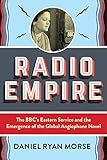Radio Empire : The BBC’s Eastern Service and the Emergence of the Global Anglophone Novel / Daniel Ryan Morse.
Material type: TextSeries: Modernist LatitudesPublisher: New York, NY : Columbia University Press, [2020]Copyright date: ©2020Description: 1 online resourceContent type:
TextSeries: Modernist LatitudesPublisher: New York, NY : Columbia University Press, [2020]Copyright date: ©2020Description: 1 online resourceContent type: - 9780231198363
- 9780231552592
- 823/.9093558 23
- PN1991.8.L5
- online - DeGruyter
| Item type | Current library | Call number | URL | Status | Notes | Barcode | |
|---|---|---|---|---|---|---|---|
 eBook
eBook
|
Biblioteca "Angelicum" Pont. Univ. S.Tommaso d'Aquino Nuvola online | online - DeGruyter (Browse shelf(Opens below)) | Online access | Not for loan (Accesso limitato) | Accesso per gli utenti autorizzati / Access for authorized users | (dgr)9780231552592 |
Frontmatter -- CONTENTS -- LIST OF ILLUSTRATIONS -- ACKNOWLEDGMENTS -- Introduction -- Chapter One Finnegans Waves -- Chapter Two Reviewing Some Books -- Chapter Three The End of Empire -- Chapter Four Intimate and Kaleidosonic Styles -- Epilogue -- NOTES -- BIBLIOGRAPHY -- INDEX
restricted access online access with authorization star
http://purl.org/coar/access_right/c_16ec
Initially created to counteract broadcasts from Nazi Germany, the BBC’s Eastern Service became a cauldron of global modernism and an unlikely nexus of artistic exchange. Directed at an educated Indian audience, its programming provided remarkable moments: Listeners in India heard James Joyce reading from Finnegans Wake on the eve of independence, as well as the literary criticism of E. M. Forster and the works of Indian writers living in London.In Radio Empire, Daniel Ryan Morse demonstrates the significance of the Eastern Service for global Anglophone literature and literary broadcasting. He traces how modernist writers used radio to experiment with form and introduce postcolonial literature to global audiences. While innovative authors consciously sought to incorporate radio’s formal features into the novel, literature also exerted a reciprocal and profound influence on twentieth-century broadcasting. Reading Joyce and Forster alongside Attia Hosain, Mulk Raj Anand, and Venu Chitale, Morse demonstrates how the need to appeal to listeners at the edges of the empire pushed the boundaries of literary work in London, inspired high-cultural broadcasting in England, and formed an invisible but influential global network.Adding a transnational perspective to scholarship on radio modernism, Radio Empire demonstrates how the history of broadcasting outside of Western Europe offers a new understanding of the relationship between colonial center and periphery.
Mode of access: Internet via World Wide Web.
In English.
Description based on online resource; title from PDF title page (publisher's Web site, viewed 25. Jun 2024)


